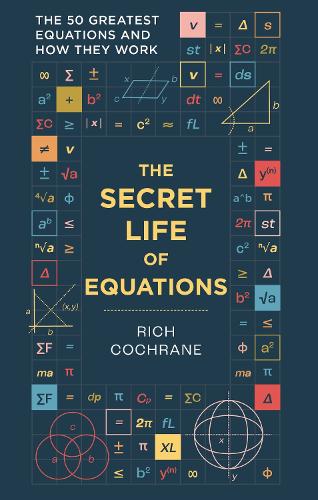
The Secret Life of Equations: The 50 Greatest Equations and How They Work
(Paperback)
Available Formats
Publishing Details
The Secret Life of Equations: The 50 Greatest Equations and How They Work
By (Author) Richard Cochrane
Octopus Publishing Group
Cassell
28th October 2025
17th July 2025
United Kingdom
Classifications
Tertiary Education
Non Fiction
Popular science
Differential calculus and equations
Physical Properties
Paperback
192
Width 126mm, Height 198mm
Description
Behind every important scientific discovery there is an equation. They are far from baffling, and now you too can understand their power and beauty! Discover the 50 equations that have led to incredible discoveries, ground-breaking technology and have shaped our understanding of the world.
From much heralded classics as e=mc2 and Pythagoras's Theorem, to Fuzzy Logic and Google PageRank, each equation is tackled head-on, broken down and explained in a unique, entertaining way so that you understand exactly how it works and why it's worth knowing about. Innovative illustrations and accessible text help you understand each equation's function, individual elements and development.Along the way you'll discover some surprising stories about the people behind the discoveries and how their brilliant insights resulted in ideas and technology we now take for granted. Covering geometry, technology, science, chance and mathematical theory, The Secret Life of Equations will enlighten and entertain in equal measure.Chapters include:Geometry and NumberTrigonometry; Fibonacci Numbers; The Fundamental Theorem of CalculusScienceNewton's Second Law; Universal Gravitation; EntropyTechnologyThe Cross-Ratio; De Morgan's Laws; Quaternion RotationChance and UncertaintyThe Exponential Distribution; The Normal Distribution; The Chi-Square TestAuthor Bio
Rich Cochrane is a writer and educator. He devises and teaches innovative maths courses for artists at Central Saint Martins, London, and lectures in maths and philosophy at City Lit. He has been commissioned by, among others, the Museum of London to bring cultural history - including maths - to a wider audience.
Rich has written books on literature, music and computing and has for many years organized public educational events in public houses and cafes in London. He also spent a decade working in the City, writing software for derivatives trading floors, which is how he discovered that maths was a lot more interesting than it seemed to be at school, and he has degrees in both maths and English literature and a PhD in philosophy.